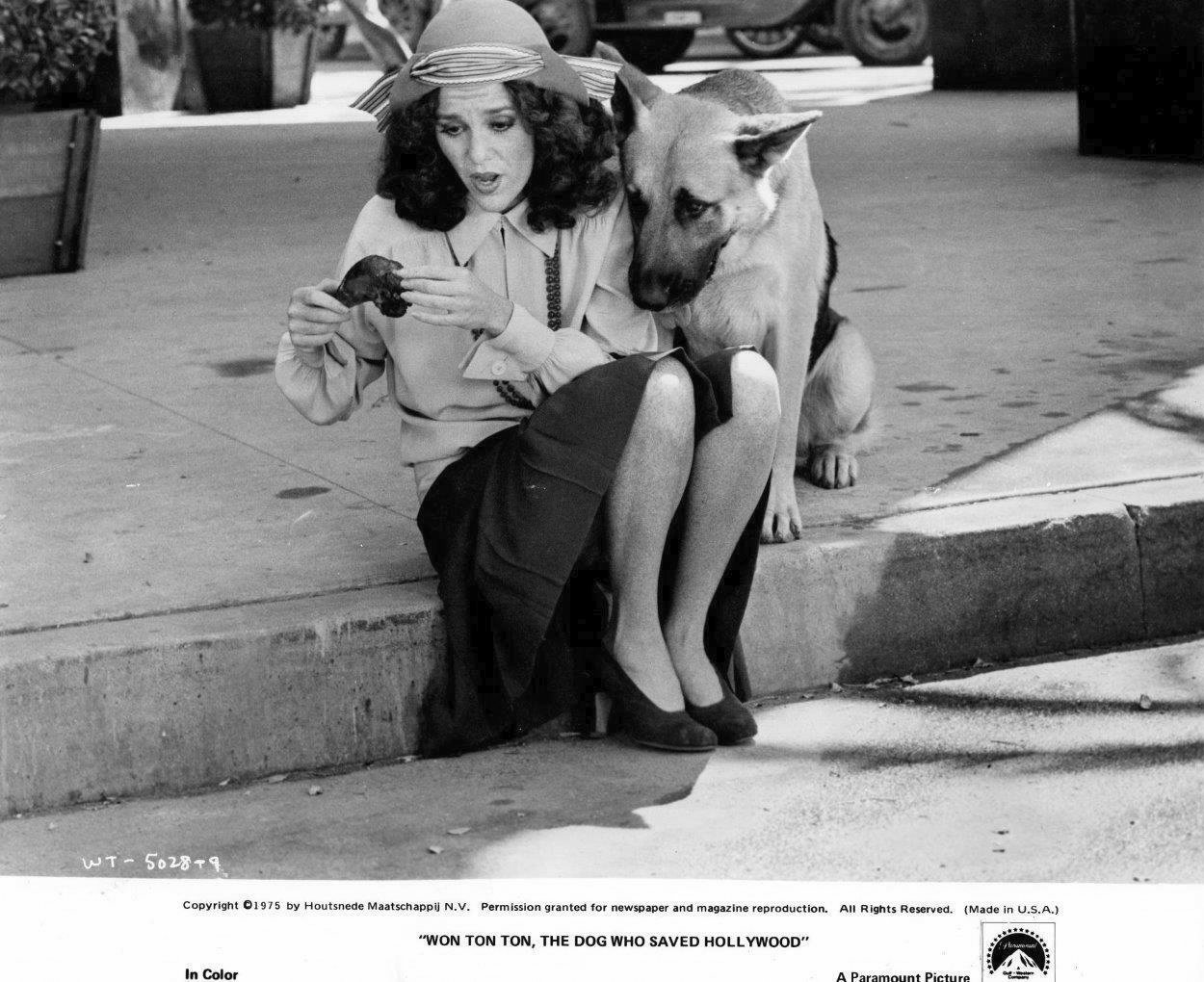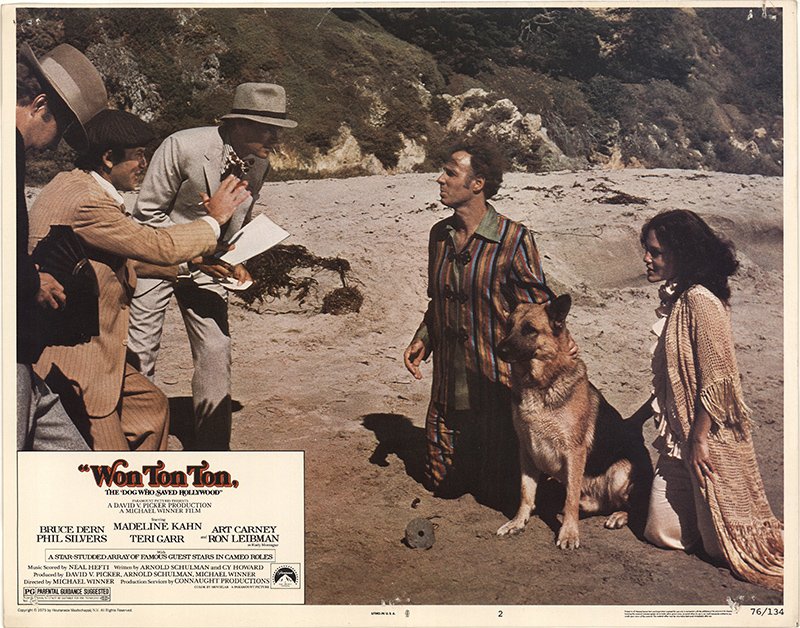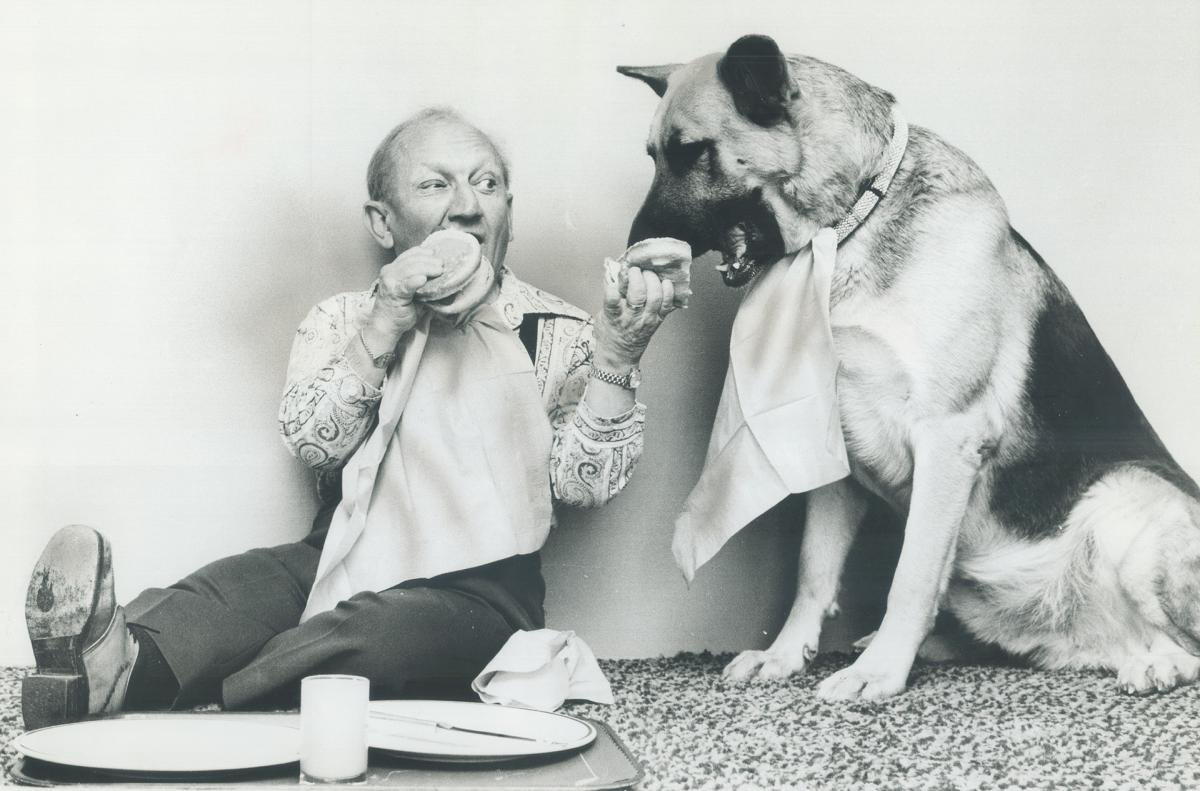The Weirdly Smutty, DOA Animal Comedy Won Ton Ton, The Dog That Saved Hollywood Wastes Cameos From Every Senior Citizen in the Business
The Misfits was famously the final film of stars Marilyn Monroe and Clark Gable. That is a remarkable duo but it’s nothing compared to the deliriously excessive 1976 show-business oddity Won Ton Ton, the Dog Who Saved Hollywood. The nostalgic comedy marked the final movie of Stepin Fetchit, Rudy Vallee, George Jessel, Ann Rutherford, Andy Devine, Peter Lawford, Johnny Weissmuller, Richard Arlen, William Demarest, Eddie Foy Jr., Jack LaRue, Janet Blair, Barbara Nichols and Benny Rubin.
That’s surprising. Who even knew all these old-timers were even alive in 1976? Then again, they were clearly just barely alive, and soon they’d all be headed to that great studio lot in the sky. Won Ton Ton ended up being the final film for a plethora of big show-business names for a few reasons. It has a spectacular, once-in-a-lifetime cast of people at the very end of their lives, for starters. The film has a huge cast that is overwhelmingly geriatric, in keeping with its nostalgia for the old Hollywood of the silent films and Rin Tin Tin, whose unlikely career and popularity inspired the film in unsubtle ways.
The film brought a bevy of senior citizens back to the big screen for one last hurrah. In that respect, the movie doesn’t resemble a commercial proposition so much as a makeshift hospice for actors whose careers died decades earlier and whose bodies would soon follow suit. It’s as if “Tongue-in-cheek cameo in Won Ton Ton” was the “Field Trip night” excursion for nursing homes throughout the greater Los Angeles area, which helps explain why the film’s “Guest Stars” include pretty much everyone who acted onscreen between the years 1915 to 1945.
But if the old folks are much of the attraction, the real stars of Won Ton Ton are such delightful New Hollywood types as Madeline Kahn, Bruce Dern and Ron Liebman, as well as the canine thespian, or thespians who inhabit the title role of a plucky dog who accidentally stumbles onto big screen stardom in the heady days of silent film.
The always exquisite Kahn lends her daffy screwball charm to the lead role of Estie Del Ruth, a talentless yet ambitious actress who will do anything to get ahead in show business, with the exception of working on her craft. Then one day a good-natured dog enters her life and while rushing to his new owner’s side to try to prevent an attempted sexual assault of Estie, Won Ton Ton, as he is known, accidentally ends up impressing a studio that immediately pegs him for stardom.
Won Ton Ton is ostensibly a family comedy about the friendship between a delightful dreamer and an adorable dog rooted in sunny nostalgia for show business past but it is also the work of Michael Winner, whose most famous/infamous films (Death Wish and Death Wish 3) are all about rape and murder, and murdering punks as revenge for rape. And Won Ton Ton is a product of the 1970s so perhaps it should not be surprising that there is an awful lot of adult creepiness in this tribute to our love for movies and charismatic movie dogs.
A near-rape sets the plot in motion, and the film somehow sees fit to include prostitution, casting couches, naked children on lawns, naked children tied up in chairs, a dog repeatedly yet unsuccessfully attempting suicide like a flea-bitten version of the male lead in Harold & Maude and homophobic slurs used more than once to denigrate the sexuality of a probable homosexual.
Yeah, things get dicey pretty quickly, but there’s a charming little sleeper buried underneath a lot of inappropriate creepiness and clunky physical comedy and automotive hijinks. An uncharacteristically goofy Bruce Dern costars as Grayson Potchuck, the (human) male lead, an ambitious schemer who makes a leap from tour guide to hotshot filmmaker with a little help from the titular canine phenomenon.
In a clever running joke, Potchuck is forever unsuccessfully pitching movies that would go on to become blockbusters in later decades (shark terrorizes New England town, little girl gets possessed by the devil) that studio head J.J Fromberg (Art Carney, clearly enjoying himself) angrily disparages as sure-fire money-losers.
The guest stars aren’t the only element of Won Ton Ton that’s ancient. The movie’s jokes loudly announce themselves as the hokey yet satisfying products of vaudeville. In Kahn, the filmmakers have a wildly charismatic leading lady who looks perfect for the silent screen era, though her quick, almost Barbara Stanwyck-like way with a sassy one liner calls to mind the heyday of screwball comedy as well.
The slapdash but intermittently clever script doesn’t always serve Kahn’s idiosyncratic gifts but there are wonderful scenes and lines scattered throughout, like when a resurgent Estie lands a comeback role in a Mack Sennett-style slapstick opus and wanders through a set-piece filled with gunfire and death and violence with the oblivious, deadpan grace of Buster Keaton.
Won Ton Ton is a dog movie yet the titular pooch tends to recede into the background, which should not be a problem in a movie shamelessly playing to people’s infatuation with cute dogs. There’s nothing inherently wrong with the dog but its only real purpose here seems to be to keep pushing the plot forward. Lassie or Benji he is not.
The throwback comedy functions largely as a movie star cameo delivery system, and as a cinephile I was a little disappointed in how many big stars of long ago I did not recognize. And while some of the cameos are cute, the film prizes quantity over quality to an almost perverse degree. Love child star turned eccentric, accomplished character actor Dean Stockwell (who would actually do much of his best work after Won Ton Ton) and are excited to see him among the bevy of stars? I do too, but you’d better not blink or you will miss his several-second cameo as an actor up for an award opposite Won Ton Ton.
Then there’s Ron Liebman, of all people, as the film’s Rudolph Valentino surrogate, a lusty sexual icon of early film typecast as sheikhs and princes and other figures of romantic fantasy. Rumors about Valentino’s sexuality abounded, but Won Ton Ton decides to make its Valentino figure both an angry, narcissistic queen and a cross-dresser who sneaks off to see (and gush about) his own movie incognito, which is how he meets Estie and helps her get into movies.
By today’s standards, it’s all pretty regressive, even without other characters calling the heartthrob of lonely woman everywhere derisive names for homosexuals. It’s not a particularly flattering or positive depiction of homosexuality but Liebman lends the character a certain narcissistic elegance that makes him more than just a glib and unkind caricature. He’s eccentric and vain and prone to rages, but he’s also weird and interesting and distinctive although the movie doesn’t really seem to know what to do with him.
Won Ton Ton is a curious proposition. It’s a smutty, leering movie directed at an audience of senior citizens, children and dog lovers as well as a dog movie that doesn’t seem overly enamored of dogs. Furthermore, it is a tribute to the silent screen era that begins with a silent movie montage and an awkward framing device involving a modern-day tour guide explaining Won Ton Ton’s significance to confused tourists that seems designed to explain to audiences what silent movies were.
The film’s disparate elements just do not come together, thanks largely to Winner’s clunky and tonally inconsistent direction yet on a scene by scene basis the movie has a lot to offer movie buffs hopelessly enamored of old Hollywood, the silent movie era and our furry, four-legged pals. I was pleasantly surprised by much of Won Ton Ton, but that’s mainly because I came to it with no expectations, not just low expectations. Won Ton Ton is certainly a good boy (yes he is! Yes he is! Who’s a good boy?!? Who’s a good boy?!?) and while it’d be a stretch to call the film named after him “good” it certainly has its moments. It’s not a dog, but not it’s not exactly a champion either.
Failure, Fiasco or Secret Success: Fiasco
Check out the Kickstarter for The Happy Place’s next book, The Fractured Mirror: Nathan Rabin’s Happy Place’s Definitive Guide to American Movies About the Film Industry here: https://tinyurl.com/2p8dn936
The Joy of Trash, the Happy Place’s first non-"Weird Al” Yankovic-themed book is out! And it’s only 16.50, shipping, handling and taxes included, 30 bucks for two books, domestic only!
PLUS, for a limited time only, get a FREE copy of The Weird A-Coloring to Al when you buy any other book in the Happy Place store!
Buy The Joy of Trash, The Weird Accordion to Al and the The Weird Accordion to Al in both paperback and hardcover and The Weird A-Coloring to Al and The Weird A-Coloring to Al: Colored-In Special Edition signed from me personally (recommended) over at https://www.nathanrabin.com/shop
Or you can buy The Joy of Trash here and The Weird A-Coloring to Al here and The Weird Accordion to Al here
Help ensure a future for the Happy Place during an uncertain era AND get sweet merch by pledging to the site’s Patreon account at https://www.patreon.com/nathanrabinshappyplace We just added a bunch of new tiers and merchandise AND a second daily blog just for patrons!
Alternately you can buy The Weird Accordion to Al, signed, for just 19.50, tax and shipping included, at the https://www.nathanrabin.com/shop or for more, unsigned, from Amazon here.
I make my living exclusively through book sales and Patreon so please support independent media and one man’s dream and kick in a shekel or two!







